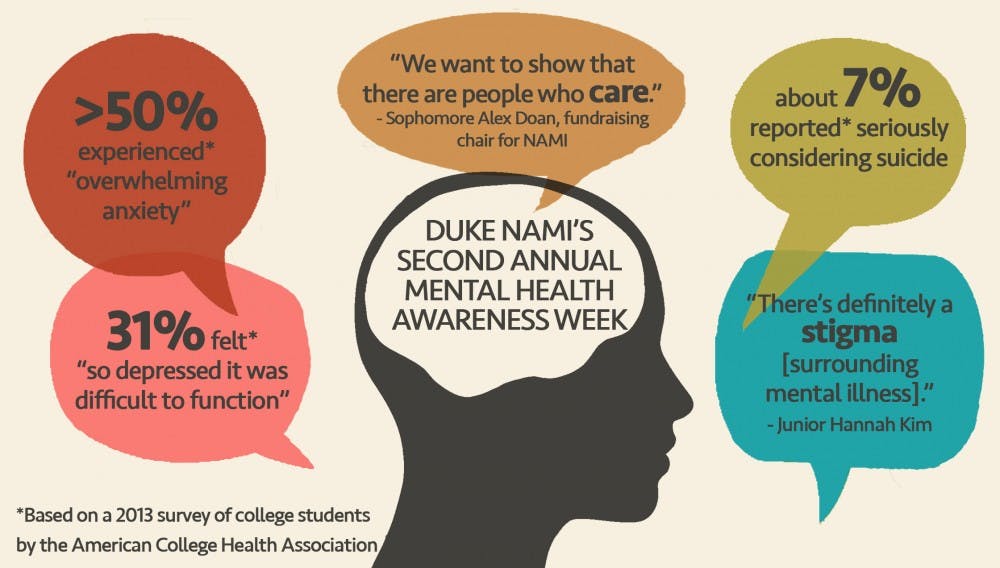Following student concerns about mental health on campus toward the end of last semester, the topic continues to spark discussion.
Duke’s second mental health awareness week—which occurred last week—was put on by Duke’s branch of the National Alliance on Mental Illness and included activities that aimed to spread the world about mental illnesses, such as a anxiety and depression, among college students.
More than half of college students nationally said they have experienced “overwhelming anxiety” and 31 percent reported they had felt “so depressed it was difficult to function” in the year leading up to a Spring 2013 survey by the American College Health Association. Approximately seven percent reported that they had seriously considered suicide.
Although many students acknowledged the ongoing campus-wide efforts to improve dialogue surrounding mental health, others pointed out that the more general issue is about the campus climate, which some believe continues to promote a culture of perfectionism.
“There’s definitely a stigma,” said junior Hannah Kim, noting that she thinks it is hard for students to acknowledge mental illnesses to themselves, let alone to other people.
Junior Sarah Clark also said that many students put up a “front” to disguise the issues they are facing.
Mental health awareness week aimed to familiarize students with NAMI’s efforts and other resources available on campus and push for further administrative efforts in addressing mental health issues, said Doan.
Sophomore Alex Doan, fundraising chair for NAMI, explained that NAMI’s goal is to create a more cohesive campus that is accepting of those with mental illnesses.
“I want to show students that people will come together for mental health,” Doan said.
Doan added that a few events put on during NAMI’s awareness week—including a letter writing event in which students could compose encouraging notes and a mental health edition of the popular show “Me Too Monologues”—have received positive feedback.
Clark said projects like “What I Be” and NAMI’s mental health week—both of which specifically target college students—have helped improve mental health awareness on campus.
Several students noted that NAMI’s mental health week helped begin conversations among their peers about mental health.
“NAMI has done a really good job having events and tying events to NAMI,” said Clark.
Freshman Gaby Salvatore also noted an increase in campus discussion concerning mental health because of the awareness week.
Despite the adequate campus resources, sophomore Tanner Johnson said students rarely take advantage of them.
“There’s a sense that people don’t want to own up to [their problems],” he said. “We need to work on acknowledging that mental health issues are more pervasive than they seem.”
Others, however, pointed out a greater issue with Duke’s campus culture.
“[Counseling and Psychological Services] is great but we need a school-wide change,” junior Hannah Schwennesen said, describing the current atmosphere on campus is “cutthroat.”
NAMI plans to address these issues by continuing to host events and working with the administration to educate faculty and staff about mental health, Doan noted.
“There are people here who care [about students with mental illness] and we want to show there are people who care,” Doan said.
Correction: This story was updated to clarify that the week was Duke's second mental health awareness week overall but not the second annual. The Chronicle regrets the error.
Get The Chronicle straight to your inbox
Signup for our weekly newsletter. Cancel at any time.

